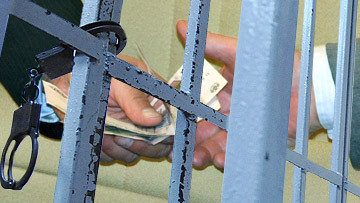On November 2, Transparency International (TI) published this year’s edition of its annual report, Corruption Perceptions Index (CPI), commonly referred to as the Bribe Payers Index.
The authors of the report concluded that if Russian companies do not change their business practice abroad, there will continue to be a cloud of questions over Russia’s attractiveness as an investment destination in the foreseeable future.
Methodology
The index of bribe takers is compiled as follows: Researchers rate 28 exporting countries and 19 economic sectors by their frequency of employing informal (corruption) practices and methods of doing business abroad.
In preparing the report, researchers polled more than 3,000 business people from both industrialized and developing countries. The respondents expressed their opinion on the particulars of doing business in each of the 28 countries in which they had business interests, and on the corresponding economic sectors. Business executives were asked, for each of the 28 countries with which they have a business relationship, “how often do firms based in that country engage in bribery in this country?”
The countries were rated on a scale of one to ten. The best results, achieved by the Netherlands and Switzerland, indicate the respondents’ confidence that companies from these countries never give bribes abroad.
The worst results, scored by Mexico, China, and Russia (in 2010, the latter two countries invested $120 billion abroad), reveal that in an overwhelming majority of cases their companies bribe officials abroad.
|
Rank |
Country / Area |
Score |
|
|
|
|
|
1 |
8.8 |
|
|
1 |
Switzerland |
8.8 |
|
3 |
Belgium |
8.7 |
|
4 |
Germany |
8.6 |
|
4 |
Japan |
8.6 |
|
6 |
Australia |
8.5 |
|
6 |
Canada |
8.5 |
|
8 |
Singapore |
8.3 |
|
8 |
Great Britain |
8.3 |
|
10 |
U.S.A |
8.1 |
|
11 |
France |
8.0 |
|
11 |
Spain |
8.0 |
|
13 |
South Korea |
7.9 |
|
14 |
Brazil |
7.7 |
|
15 |
Hong Kong |
7.6 |
|
15 |
Italy |
7.6 |
|
15 |
Malasia |
7.6 |
|
15 |
South Africa |
7.6 |
|
19 |
Taiwan |
7.5 |
|
19 |
India |
7.5 |
|
19 |
Turkey |
7.5 |
|
22 |
Saudi Arabia |
7.4 |
|
23 |
Argentina |
7.3 |
|
23 |
United Arab Emirates |
7.3 |
|
25 |
Indonesia |
7.1 |
|
26 |
Mexico |
7.0 |
|
27 |
China |
6.5 |
|
28 |
Russia |
6.1 |
|
|
GPA |
7.8 |
Intermediate results
The conclusions of the authors of the 2011 ranking for Russia are as pessimistic as they have been over the last few years, when it has regularly occupied the last places.
The authors agree that it will be very difficult for Russia to persuade current and future investors of the effectiveness of anti-corruption measures within the country if Russian businesses are systematically proving the contrary abroad.
They see a glimmer of hope in the recent changes in Russian legislation that make legal entities criminally liable for corruption and introduce punishment for the bribery of foreign officials. Russia adopted these amendments to its Criminal Code during its preparations to join the Organisation for Economic Cooperation and Development’s (OECD) Convention on Combating Bribery of Foreign Public Officials in International Business Transactions.
Perception Table shows that construction companies are more prone to giving bribes than other businesses. Noticed all over the world, this trend has been observed in a huge number of Russian construction companies.
Public works contracts and construction occupy the last place in the ranking, with 5.3 points. The authors note that in the construction sector in particular the violation of the established rules and poor quality of work could have disastrous consequences for public safety.
They also point out that oil and gas companies are particularly accustomed to giving bribes. Extractive industries have long stood out as having higher risks of corruption. For example, in Nigeria, those guilty of bribing officials were forced to pay fines totaling more than $3.2 billion in 2010 and 2011 alone.
The light industry and agriculture are the least corrupt, with 7.1 points.
Table: Perceptions of Foreign Bribery by Sector
Sectors are scored on a scale of 0-10, where a maximum score of 10 corresponds with the view that companies in that sector never bribe and a 0 corresponds with the view that they always do.
|
Rank |
Sector |
Score |
|
|
|
|
|
1 |
Agriculture |
7.1 |
|
1 |
Light manufacturing |
7.1 |
|
3 |
Civilian aerospace |
7.0 |
|
3 |
Information technology |
7.0 |
|
5 |
Banking and finance |
6.9 |
|
5 |
Forestry |
6.9 |
|
7 |
Consumer services |
6.8 |
|
8 |
Telecommunications |
6.7 |
|
8 |
Transportation and storage |
6.7 |
|
10 |
Arms, defense and military |
6.6 |
|
10 |
Fisheries |
6.6 |
|
12 |
Heavy manufacturing |
6.5 |
|
13 |
Pharmaceuticak and healthcare |
6.4 |
|
13 |
Power generation and transmission |
6.4 |
|
15 |
Mining |
6.3 |
|
16 |
Oil and gas |
6.2 |
|
17 |
Real estate, property, legal and business services |
6.1 |
|
17 |
Utilities |
6.1 |
|
19 |
Public works contracts and construction |
5.3 |
|
|
GPA |
6.6 |



